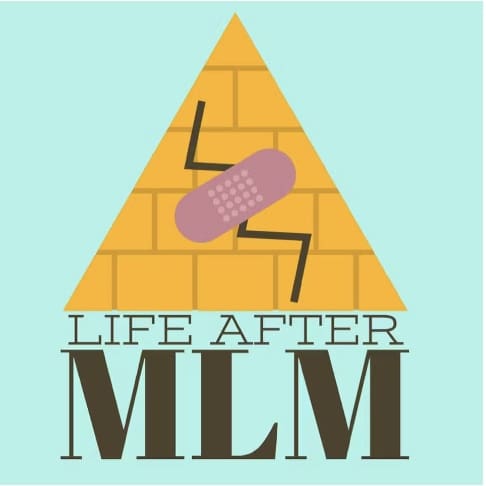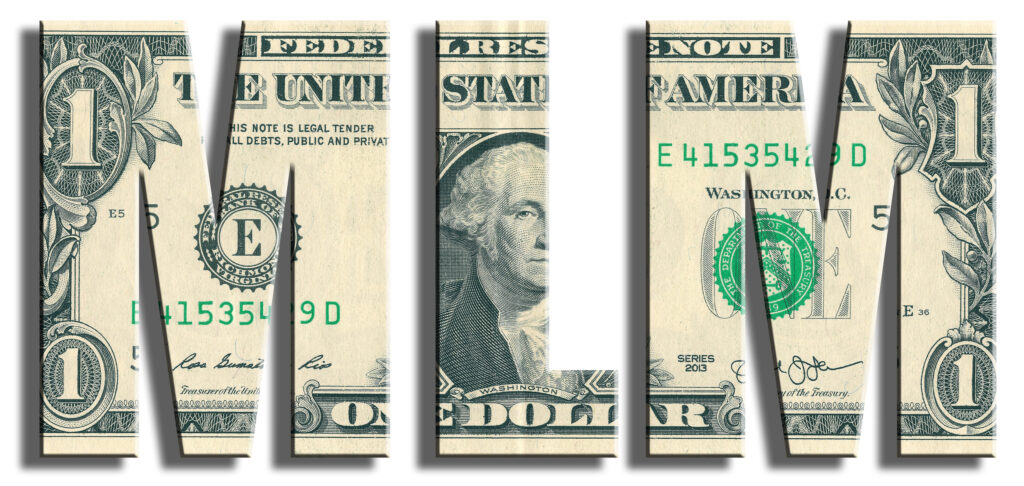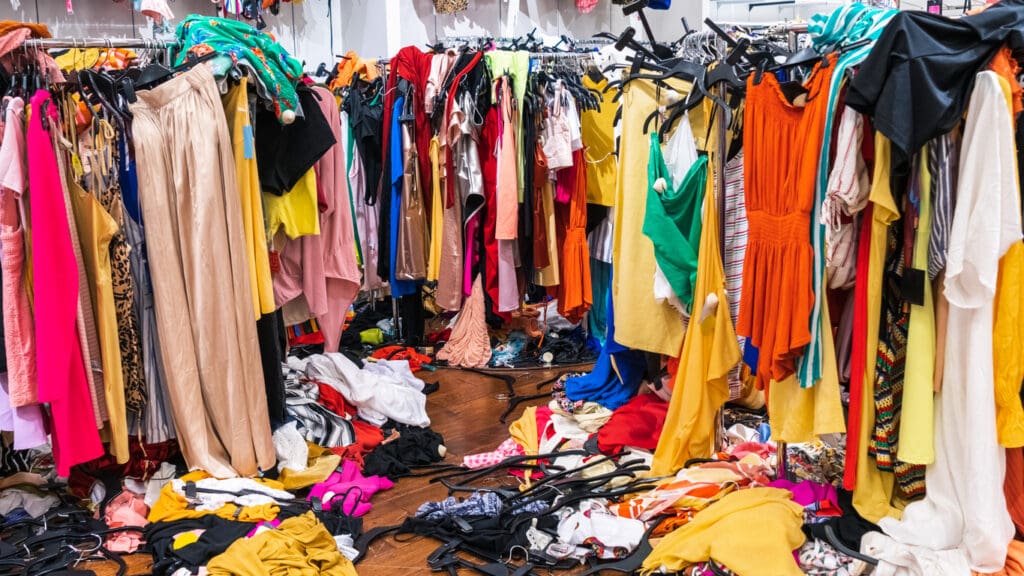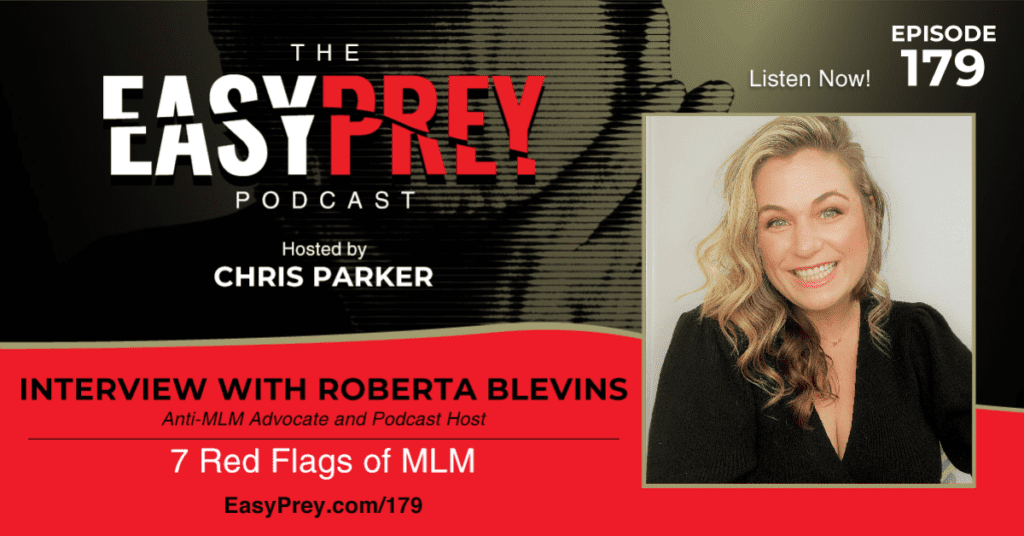
Many people have ended up in an MLM because they wanted to help a friend out. But it is important to understand the red flags of how they can motivate and manipulate. Today’s guest is Roberta Blevins. Roberta is an anti-MLM advocate who starred in the Amazon Prime documentary Lula Rich and speaks out on social media against MLMs, scams, frauds, and cults and is the host of the podcast Life After MLM.
“I didn’t know it was a pyramid scheme. I didn’t know it was like a cult. I just knew it wasn’t a business.” - Roberta Blevins Share on XShow Notes:

- [0:45] – Roberta shares her background and what she does now.
- [2:20] – In 2015, Roberta heard about LulaRoe and was initially very excited.
- [3:34] – She wasn’t making any more than she had been making in the job she left, but was working a lot more.
- [4:40] – Roberta realized that it wasn’t the right way to run a business and it took a toll on her and her family’s mental health.
- [6:17] – Pressure and pushback against questions are major red flags.
- [7:28] – Avoid being alone and being led to a second location when talking to someone.
- [8:28] – Roberta explains how different MLMs operate under a pay-to-play model.
- [10:05] – The only way to make money is to hit qualifying monthly quotas that are a big challenge to accomplish.
- [11:58] – What is the difference between a pyramid scheme and an MLM?
- [14:43] – MLMs tend to invade every area of your life.
- [16:10] – Many people have a fake-it-till-you-make-it approach which is misleading people to be recruited.
- [19:26] – Social media plays into this fabricated lifestyle.
- [21:42] – MLMs exploit personal relationships.
- [22:54] – Roberta shares how “icky” it felt to keep a “dirt list”.
- [24:38] – There are stories of some people signing up their children in order to meet their recruitment quota.
- [26:30] – Roberta explains the history of MLMs and how they started.
- [29:21] – MLMs aren’t going anywhere, but Roberta wants to see regulation in an unregulated space.
- [31:48] – Roberta shares about some of the background work she is doing to help create dialogue about regulation.
- [34:12] – Social media has strengthened MLMs and has gotten more people to sign up.
- [35:53] – In some MLMs, more than half of the sellers are making no money.
- [37:26] – Numbers don’t lie. If you are spending or making money, you should track it.
- [38:51] – Track any amount of time you spend on the business.
- [41:07] – Roberta outlines a strategy if you are in an MLM and deciding if it is the right fit for you.
- [44:30] – Have someone who is unbiased listen to you. Be that person for someone else.
- [46:35] – A company should be able to stand up to scrutiny.
Thanks for joining us on Easy Prey. Be sure to subscribe to our podcast on iTunes and leave a nice review.
Links and Resources:
- Podcast Web Page
- Facebook Page
- whatismyipaddress.com
- Easy Prey on Instagram
- Easy Prey on Twitter
- Easy Prey on LinkedIn
- Easy Prey on YouTube
- Easy Prey on Pinterest
- Roberta Blevins Web Page
- Roberta Blevins on Instagram
- Roberta Blevins on YouTube
- Roberta Blevins on Twitter
- Life After MLM Podcast
Transcript:
Roberta, thank you so much for coming on the Easy Prey Podcast today.
Thanks for having me. I'm excited to talk.
This will be a blast. Can you give myself and the audience a little bit of background about who you are and what you do?
Yeah. My name is Roberta Blevins, and I am an anti-MLM educator and advocate. I talk about pyramid schemes, cults, frauds, scams. I do red flag education. I was in a documentary about the pyramid scheme I was a part of. It was called LuLaRich. I have a podcast where I talk to other victims of cults, frauds, and scams, and it's called Life After MLM.

Life After MLM, I like that. For everybody out there, we will link to all of those. I have actually watched it. Was it Netflix?
Amazon Prime Video.
I have watched it. I was trying to remember, do I remember you in this? It was a few years ago, so I'm not sure.
I will jog your memory. I'm the one that says, dead-fart leggings. I'm also the one that calls it a cult. I think I'm the only one that curses in it as well. It gets spicy.
It was quite a bit, if I remember. Let's talk a little bit about your experience in LuLaRoe because I think that will direct our conversation as to where we go and how we talk about pyramid schemes, MLM, and where practices become exploitive. Let's just spend five minutes, if you can, about your LuLaRoe experience.
Yeah, I've told this story enough times; I can condense it down to five minutes. I heard about LuLaRoe in 2015. I had already been a part of another MLM. It was called It Works, which I didn't really like at all and had left pretty early.
It didn't work?
It didn't work. Weird. I heard about LuLaRoe, it was very different from It Works. That was one of the things that I was like, “Oh, it's not like those MLMs where everybody sells the same thing. This is so much better.” I was really excited about doing something like that.
I was a mom, a young mom, and a new wife. I was like, “I’ve got to bring everything home. I need to be here with my kid. I need to just be whatever society wants me to be.” I was like, I needed to do this. It was just this urge.
I joined LuLaRoe. I heard about it in 2015. I joined in early 2016. I got out in fall of 2017, so it was about 18 months that I was in. I grew very quickly in the company. I had a team of 75 women underneath me, which if we're an MLM like LuLaRoe, it's decently OK.

I was probably about the top 5% of the company. I made a decent amount of money. Unfortunately, it was all on bonus checks. It only replaced the income that I had quit to do LuLaRoe full time, so I wasn't really making anything more than I was already making before, but it was working a lot more.
There were a lot of little things like that that I didn't really see in the beginning because there's so much dopamine manipulation. I was so excited to go to all these events, all these parties, all these things. It wasn't until some things happened that they talked about in LuLaRich. There was a buyback policy and a lot of things that I didn't agree with the way the company was acting.
I was a hairstylist by trade before all of this. I'd run my own booth and a salon for a very long time, so I understood basic business. When I started having problems with returns and defective products, and they would give me the runaround, I was like, “This is not how you run a business.”
There'd be things where I'm like, “Well, we can fix this. This is an easy fix.” And I would give this example. They're like, “Oh, yeah,” and they would never fix it. I kept thinking a real business would fix it. A real business would think this was an issue.
I didn't know it was a pyramid scheme. I didn't know that it was a cult essentially, as well, or any of these things. I just knew it wasn't a business, so I was like, “I’ve got to get out of this.” It's messing with my mental health. It's not making my family happier. I'm a completely different person. I didn't even recognize myself.
I didn't know it was a pyramid scheme. I didn't know that it was a cult essentially, as well, or any of these things. I just knew it wasn't a business, so I was like, “I’ve got to get out of this.” It's messing with my mental… Share on XI got out, and I started researching and figuring out what it was, and then I started talking to the media because at the time, there were not a lot of people talking about this using their real name and willing to fill in the record publicly. I just happened to be at the right place at the right time.
That led to a Vice documentary we did, which led to LuLaRich. In that time also, I was working with the Attorney General of Washington on a pyramid scheme case against LuLaRoe. I was an informant for them gathering evidence, and then I also took the stand and was deposed. We almost went to trial, but LuLaRoe settled for $4.5 million a few days before we were supposed to go to trial. I started my podcast like a week later, and here we are today.
Having watched LuLaRich, it’s such an interesting story of what happens. One of my friends had asked my wife, “Hey, should I start doing this?” She asked her a couple of questions and heard about this $5000 starter package or something, and my wife was like, “Nope, run. Run for the hills.”
We'll talk about some MLM stuff, and then we'll talk about Ponzi schemes in general. What are some of the red flag warning signs, abusive, exploitive MLM is going to be using, or should be the run-for-your-life warning signs?
I always say red flags would include a lot of pressure. You don't want to have a lot of pressure. Also, if you ask questions, and you get a lot of pushback for asking questions, or you're told that you're being negative, or you're not looking on the positive or the bright side. If you express genuine concern, like real concern, and it's brushed off, those are a lot of red flags for me. That's usually when you're in the organization.
If you express genuine concern, like real concern, and it's brushed off, those are a lot of red flags for me. -Roberta Blevins Share on XI would say, before you join, some of the red flags, maybe somebody on social media saying that they have an opportunity, but they're not willing to give you the name of the company because they don't want you to be able to google and figure out your own information and do your own research before meeting with them.
It's like, “Hey, I want to tell you about this opportunity, but I only want to tell you about it in person.”
Right. I always joke and I say, “Never.” In the anti-MLM community, anybody that has been in a multilevel marketing company, a hun. It's an affectionate term. It is not degrading at all, and it's gender-neutral. It comes from the message, “Hey, hun,” like when you message somebody.
I call myself an ex-hun. I joke and say, “Never follow hun to a second location.” You don't want to get alone. You don't want to be by yourself where you can be manipulated, especially if they bring someone else in. “Oh, talk to my mentor, my upline, my whatever.” There's always going to be some term.
There's always going to be that second location, where they can't give you the information publicly. I'll DM you, I'll send you a message, check your inbox, that kind of thing. I think all of those are red flags. I think if it's a legitimate company, you should be able to say that it's this, and then that should be able to stand up to some scrutiny because not everything is positive all the time. A lot of toxic positivity would also be a pretty big red flag for me as well.
Are there specific things as part of the sign-up for the organization like large fees, you have to maintain inventory?
Speaking of the pyramid scheme, specifically, there are a couple cornerstones and telltale signs. One of them is going to be the pay-to-play, which essentially means that you have to pay to play the game. We'll just call MLM a game that gamifies most everything in it anyway. MLM is the game, and to play, you have to pay. This can look like a variety of things.
Some MLMs will be free to join. They'll be like, “It's free to join this month,” and you're like, “I didn't pay to join.” The problem is, even though it's free to join, the first thing that's going to happen right after you join is they're going to try to get you to buy a kit because you can't sell the product if you don't know what it's about. It's got to be a product of the product. Right there, there's your pay-to-play.

A lot of times, within like the first maybe three days to a week, you'll get a really, really steep discount for joining. It's like the best discount, and you'll never get it again, and you can only get it now. That's another red flag. As soon as you're getting in, you're making another really big purchase.
Most MLMs are going to cost around $99 to join—that’s just average. Some will be a lot more, some will be free, some will be less. I've seen MLMs for like $10 this month. It doesn't necessarily mean anything if it's one side or the other, but the pay-to-play aspect is always going to be there.
It also looks like going to a convention. You're paying for that ticket, you're paying on your dime, you're staying in a hotel. Even though the money isn't going directly to the MLM at that point, there's still a pay-to-play aspect, and that goes into the sunk-cost fallacy, which ends up keeping you in longer because you feel like you've invested so much, you don't want to let it go. That just continues.
The pay-to-play is one. Another cornerstone of an MLM is going to be the endless chain. The endless chain is that it never ends. It's an endless chain. It's always, always, always, always going with an MLM or a pyramid, whatever it is.
Specifically with an MLM, each month, you have to hit your quota. At the beginning of next month, it resets. You always have to constantly be hitting these quotas to be able to qualify to even get your check. If you don't qualify, you don't get paid. There's a lot of that stuff. It's not like you're getting paid hourly, regardless. You have to qualify for these things, and it always resets.
Let me take a step back. When you talk about if I don't hit my goal, if I say the goal is $1000 a month and I sell $900, I don't get any commission or anything off of that?
It's going to depend on the MLM. You might get a commission, maybe a 20% sales commission, but you won't get your other commissions and unlock your other bonuses because you haven't hit that number to qualify to unlock those things.
Qualifying is something that has to happen in this because if you don't qualify, the person above you is not going to qualify, because most times, they have to have some certain specifications to qualify as well, so it can be this chain thing there. People are constantly leaving. As the bricks start to come out of your pyramid, you have to replace them with other bricks.
Hopefully, they're not a load-bearing brick because a load-bearing brick is going to be a lot harder to replace and fix. That's that endless chain. There's no moment of like, “Oh, I got the job. I just go nine to five, and I get the weekends off, and then there's no stress there. I just leave my job at the door.” It's not like that.
There's no moment of like, “Oh, I got the job. I just go nine to five, and I get the weekends off, and then there's no stress there. I just leave my job at the door.” It's not like that. -Roberta Blevins Share on XIt's always going. You're always constantly on. You're always trying to get somebody. You never want to leave any money on the table. You never want to leave anybody unread or something, anything like that. That's the endlessness of it. Then you have the recruitment mandates. There's always going to be a recruitment factor. That's the distinction between an MLM and a pyramid scheme, but potato, po-tah-to.
With a pyramid scheme, there usually is only money exchanged. There's no product. An MLM, money is exchanged for a product, so a product becomes the money that's being exchanged around. That's really the distinction there. But this recruitment mandate means that you have to recruit to be able to really get that money.
There are exceptions where there are people who are just incredible sellers. I knew a couple of people like that in LuLaRoe. They had very small teams, if teams at all, but they were just high-volume, incredible sellers. I know people like that as well. There are my friends that do that too. That's a really great exception, but it's definitely not the rule.
With that recruitment mandate, that just means that without recruiting, you'll essentially stay at the bottom, which we call the last ones in. The last ones who never have anybody beneath them will never get the bonus checks, and that's where the big money is in these organizations.

The fourth cornerstone is the extreme money transfer. With an extreme money transfer, you're going to be seeing the majority of the money going to the minority of people, which are going to be the 1% at the very, very top, and the majority of the people are making little to nothing. All of that money is being transferred to the top through this bonus structure and through everybody getting exponential percentages throughout the entire organization.
Those are the four cornerstones that are red flags to me. Just something to think about. You can figure it out and go, “OK, I see how this is. That could be a red flag, or that could be concerning.”
I don't like to tell people, “Don't do it,” although I would never again. I'm not the person that says, “Don't do it. You should quit,” because what I want to do is I just want to give you the information. I want you to come to that conclusion on your own. If you look at it, you do all the numbers, you do all the money and you're like, “You know what? It works.” Then work it.
If it doesn't if you're losing money, and if it's draining, you're spending your time, you're spending your mental health and your mental energy, your physical energy, you're taking time away from what you like to do, you're taking time away from your family, your friends, your spouse, whatever, it becomes really, really draining when you're on 24/7. You get burned out really, really quick.
Again, I just want people to see what those red flags are so they go, “Oh, wait a second. I'm going to pay attention to that because that might become a little bit bigger of a red flag that I'm seeing now.”
Is it that the organization, the opportunity becomes more of a lifestyle than—it's one thing you feel like, “Hey, I could do all my work from 8:00 AM to 5:00 PM, and then my nights and weekends are free.” But when it starts invading every area of your life…
Yeah. Most of the people that I talked to invaded every area of their life. There are very few people that I talked to that were like, “I had a really great experience. I made a ton of money. I didn't spend a ton of time. It was totally worth it.” Maybe only 1%, really. Very few people have that experience.
Most people, even people that were successful and made money, at some point there is a moral dilemma where you realize what you have to do to keep up with the facade because unfortunately, the structures just are not stable. They eventually collapse just like a Ponzi scheme.
You have to pay attention to that because it can collapse and you can lose everything, because even though people think that this is their business, they really are just a 1099 contracted salesperson who works for commission. They don't get anything hourly; they have no benefits. They have nothing.
If the MLM goes down, they lose everything. They lose their entire organization that they built. They lose the bonus check that they're counting on every single month. It can be very devastating and dangerous if you are not… Share on XIf the MLM goes down, they lose everything. They lose their entire organization that they built. They lose the bonus check that they're counting on every single month. It can be very devastating and dangerous if you are not watching and paying attention.
And there's nothing being paid into unemployment, all that kind of stuff.
Right. No retirement. No 401(k). You're using a lot of your savings, which is another thing where you get into this lifestyle, like you talk about, because there are specific people where they have to fake it till you make it. But you want the appearance of being successful because if you look successful, then when you approach people or people approach you about the opportunity, they're more apt to join you because you look successful. You look the part.
In fact, certain MLMs will have vendors outside their conventions that rent Louis Vuitton purses and very expensive Versace suits and shoes, so the people on stage can just rent and wear it to appear more successful on stage. It's literally happening outside. You guys are walking right past it. You don't even see it, because you don't want to see it because of this lifestyle, this promise of the American dream.
In fact, certain MLMs will have vendors outside their conventions that rent Louis Vuitton purses and very expensive Versace suits and shoes, so the people on stage can just rent and wear it to appear more successful on stage.… Share on XAll they have to do is, “Step one, two, three, and four, and then I'll get all the things. I just have to do what my upline is doing. I’ve got to do what the successful people are telling me to do.” A lot of times, that looks like maybe taking a little bit more money and buying a little bit more product because you have to meet a quota, and you didn't, and you have two days.
“My bonus is going to be $2000, but I have to spend $500, and $500 is less than $2000, so I'm going to rob Peter to pay Paul. I'm going to get my money, and then I'll just have a $1500 bonus instead.” You're buying your rank. You’re buying your levels. You’re buying your bonus, and it can get really, really dangerous.
You're buying your rank. You’re buying your levels. You’re buying your bonus, and it can get really, really dangerous. -Roberta Blevins Share on XOnce you do it one time, even if it's tiny, and you make that exception, and you just push reality a little bit, it's so much easier to keep doing that. I've had people that come on the show that talk about—she's one of my best friends now, but she confided in the show that she signed up her cat for her MLM because she needed another account that month to qualify. She made an email address for her cat and signed her cat up.
It's this kind of stuff where you're like, “I would never do that,” but sometimes, you get put in a position where you're like, “I really need that bonus check. That's going to pay my mortgage. I've already spent half of it to get it. I can't lose it.”
You end up doing things that look a lot like desperation and things that you promised yourself you would never do. You're just like, “Oh, well, I've already done it. I might as well just do it when I need to. It's not that bad. It’s not that harmful. It's harmless. It’s not that difficult, whatever.” You make excuses for it.
If you have $500 inventory this month, the next month you have $1000. The next thing you know, your entire garage is full of products that you can't sell.
Yeah, we call that garage qualified.
That's bad that there's a term for it.
Yeah.

I guess that's one of those red flags. If you start inventorying, these days…
Front-loading is what we call it.
There's no reason to inventory anything anymore. Even Apple doesn't inventory stuff. When I order my new iPhone, it doesn't come from San Jose, California. It comes straight from Shenzhen.
Right. Yeah, it's interesting what happens.
Yeah. I guess it's part or one of those that social media plays into this lifestyle that is, “Oh, it's all this good stuff.” The reality is, it's a sales job. You have to be able to sell products. If you can't sell a product, you're not going to get any commission.
Right. Most MLMs say they focus on sales, and the legality is that they should be focusing on sales, but there is a very hard recruitment push. A lot of times, you don't even notice it. It'll be in little things like, never miss an opportunity to share the opportunity.
We were taught to scroll through Facebook. Any products that my company sold that could help somebody, if I would scroll through Facebook, and I saw somebody complaining about it, and I offered something that could help them, we were taught to reach out and offer. “Oh, I have something that can help you if you'd like.”
You're looking for people. You're targeting people, essentially. You're like, “Who's vulnerable today? I'm going to look for stay-at-home moms looking for money,” and then you scroll looking for stay-at-home moms on Facebook who want to make a little bit of money, complaining about how dance lessons are too expensive, complaining about how the cost of gas is going up.
Really, really easy, normal things that you would be seeing on Facebook, whether or not it's public or private, to your friends. It's like, “I can't believe gas is so expensive,” with a screenshot of whatever you paid for gas. That opens you up to somebody saying, “I have a solution to your money problem.” You're taught to do that. You're taught to prey on people, unfortunately.
As opposed to maybe you need to find a new job or other ways.
Right, instead of just being a supportive friend or being like, “Oh, that sucks. Like, I switched to a hybrid, and it helps,” anything like that. It's always turning all of your friendships and your relationships and commodifying everything and monetizing your relationships.
It's always turning all of your friendships and your relationships and commodifying everything and monetizing your relationships. -Roberta Blevins Share on XIs that like, that's been my experience of being in tangent to people who've been in network marketing or MLM. It's always exploitive of personal relationships. I don't know if I have ever asked any of my friends, “Hey, come to my website and buy a product that I might get commission on.” Half my friends don't even understand what I do, let alone have I told them to go to my website and do something.
Right. It's a very strange thing. MLM, we call it a couple of different things, but I think most commonly, it's referred to as a dirt list. You write this dirt list, and it's basically the people in your life that would buy dirt from you. They're the people that will support you no matter what—they’ll buy dirt from you.
If you need to sell lipstick, if you need to make your quota at the end of the month, if you need somebody to sign up. “You don't need to sell anything, I just need a warm body.” That's your dirt list. It's going to be your mom, your sister, your best friend, your coworker's wife, husband, or whatever. That's your dirt list.
You're going to make your next secondary list for the people that you think might support you, or the people that you come across every day that you think might need the opportunity, even if you don't know their name. You can write a checker at the grocery store, or a barista at Starbucks. For me, it made me feel really icky. They're like, “Just write down what they do.” I was like, “But I don't even know them. I don't know them well enough to know their name. I don't have their phone number on my phone. I don't know these people. Why do you think that I should ask them if they want to sell leggings? This is so strange.” This is not how you do business. Again, these red flags were slapping me in the face, and I'm just making excuses for all of this.

Are there any warning signs of friends of people in MLM if they're asking me—it's one thing like, “Hey, yeah, I want to buy this product.” But they're like, “Oh, yeah, buy this product, but I need your Social Security number, or I need you to fill out this form and go to this website,” where they're surreptitiously signing you up as a downline. What are the warning signs of what is happening to somebody?
Yeah, that actually was how I joined my third MLM, Modere. I accidentally joined. I should have known because she was like, “Oh, you can get this really great discount. You just pay $40, and you just fill out this form.” It was, literally, my name and Social Security number, and I don't know why. I was just like, “Oh, my God, I just like da, da, da da.”
I got this pack of stuff, like $300 worth of stuff for $40. I was like, “Cool. Even if I don't use all this free stuff, I don't need it.” I ended up selling it all on eBay, and I actually didn't profit. I was just like, “What did I do? What?” I got a letter in the mail with a credit card/debit card thing. It was like, “Welcome to the family.” I'm like, “Oh, no, what have I done?”
I hear this too. I've heard some horror stories, where my mother signed me up for her MLMs when I was 17, 18, 19 years old because she needed a warm body on her team. She used my Social Security card to do this.
You also hear about upline saying, “Oh, if you can place an order, I'll Venmo you the money. I just want to put it on your account because we just need the PV on your account, because so-and-so is trying to get her car bonus. Don't you want to help so-and-so? She's going to Venmo you the money, and then you can keep the product. It's totally fine.”
They're like, “OK, I'll keep the product and you will pay for it? Sounds like a good deal to me. I really wanted to try that protein powder, but I don't have it yet.” It's this stuff that is a really big red flag. If you are going to have a business, you should treat it like a business, not like a gambling, shuffle game like a card swap game, shell game.
It's almost like at some point, there was a legitimate business in there, and then everybody is working to find the loopholes to exploit to make more money off the business. It becomes more about playing this game as opposed to just selling the product to people.
Back in the 1950s, 1960s, right after World War II is when network marketing, direct sales, multilevel marketing came into play. It was right after the fear of World War II, not having the American dream, we lost so much time, purity culture, Christianity, and all that stuff all came together. And multilevel marketing was born out of that.
Back then, it was really just like door-to-door sales. Your Fuller brush guy, your Kirby vacuum salesman, the Avon calling, those were all totally normal. Direct sale, straight to customer, like, “I'll come to you. You’re the stay-at-home mom. You need to buy a vacuum. I'll bring the vacuum to you.” It was a commission-based thing.
Some of them did have a multilevel marketing thing that was invented a few years later with, I believe, it was Holiday Magic. I want to say it was William Penn Patrick that invented them alone, but I might be a bad advocate right now. There are so many names of white guys who are shady, and they just all blend together. I believe it was William Penn Patrick and Holiday Magic.
It created this multilevel structure. In the 1960s, 1970s, there was an MLM called Nutrilite that was also shut down for being a pyramid scheme by the FTC. What happened there was two of the top sellers of Nutrilite defected from Nutrilite. They were like, “We're getting in hot water with the FTC. We’ve got to get out of here. They defected from Nutrilite and Nutrilite ended up going under.
Those two people were Richard DeVos and Jay Van Andel, and they ended up creating their own MLM called the American Way or as we all know it, Amway. They started Amway, and they were running an MLM, but there were not a lot of rules. There was an MLM that went down called Koscot Interplanetary. It was a makeup company.
With this deal with the FTC, they made a set of rules for these kinds of businesses. They're called affectionately the Koscot rules. Everyone is following the Koscot rules until Amway. There was a fight with the FTC that started in 1975, and it was finally finished in 1979. That was how we got the Amway rules, which are a little bit different.
Again, it deals with the 70/30 rule with making sure that 70% of your product is sold before you buy more and a couple of different things, and that 70% of the product is actually making it out of the company instead of staying in. There are different rules for the Amway rules.

A judge who was not really affiliated with the case who just stepped in for the day, basically—I'm paraphrasing. You can read all this in Ponzinomics by Robert FitzPatrick, but I'm paraphrasing this. He looked at it and he went, “This looks like a business to me.” He's like, “Yup, approved.” At that moment, multilevel marketing underneath the Amway rules became legal. It's really just loopholes to protect these businesses.
Essentially, what happened was all those direct sales companies decided, “We're going to just go with the Amway model,” so MLM was born. In the 1980s is where we really see it proliferate with Amway, Shaklee, Mary Kay, Avon, USANA, big, big, big, big MLMs. All of those guys.
There was the Reagan era. The guys from Amway gave Reagan more money than Reagan spent on his campaign. He gave them jobs in his cabinet, and he put them in the Chamber of Commerce. It's just bad. It's just barely bad. That's how MLMs became legal in the eyes of the government.
I know MLMs will never go away. I just want to regulate an unregulated industry because we've seen what deregulation does. We've seen it in the financial industry. We see it in what just happened with the Titanic.
Things without regulation; stuff is not great. There's a reason that we have regulation: to keep everybody as safe as possible. I fight really hard to make sure that people understand. I also work on the back end, working with other regulatory agencies, to work together about helping create new rules and craft new laws in the future, to just help regulate an industry that just needs regulation to protect people. If we want MLMs to be legitimate and we want to legitimize them, then we need to add rules and regulations.
If we want MLMs to be legitimate and we want to legitimize them, then we need to add rules and regulations. -Roberta Blevins Share on XWhat are the organizations that are working on regulating it? Has there been any recent successes or new legislation coming down the line that's going to go into effect?
The FTC is working really hard on trying to do some regulation. Last year, we reopened the business opportunity rule for a comment period. It hadn't been opened in 10 years since it was written back in 2012, which essentially, the Biz Op Rule was created for multilevel marketing.
With their lobbying firm, the DSA, the Direct Sellers Association, they effectively lobbied their way out of the rule that was made for them. Other gig work has come up since. Because of Uber, deliveries, eats, drivers and all this stuff, and there's all this good work, they wanted to come up with new business opportunity language to include that to protect everybody.
Coming into that comment period and having it open, we did a really hard push and said, “Everybody needs to share about wanting to regulate this industry and why you think it should be regulated.” Thousands and thousands of comments. It was really, really incredible. The FTC was like, “We heard you. We’re going to look into this. Thank you so much.”
Right now, we're in between the next stages of opening up. It was basically all the red tape in the government. The first step of red tape is like, “Here's the question: Should we think about looking into this?” Everybody says, “Yes.” They're like, “OK. Now we're thinking about looking into it.” There's this next step that we have to wait for.
We work with a lot of consumer protection agencies in the DC area. We were in DC, a group of friends of mine and colleagues. We were in the DC area for a conference that we had earlier this year.
We were able to meet with some of the regulatory agencies and representatives to just have really open dialogue from somebody who's on the grassroots floor and talking to victims every day and saying, “This is what people are concerned about. They really like this. They really hate this. How can we make this a safer environment for everybody? This is what I'm seeing. This is what people are telling me.”

I have members of the FTC and the Washington Attorney General's office that listen to my podcast. I knew that because when I met them, they're like, “Oh, my God, we're such big fans of your podcast.” I was like, “What? Hi, who? Members of the FTC? What? OK.” I make a lot of jokes where I'm like, “FTC, are you listening?” I know they are.
It's just a very interesting thing. For me, I want to make it a safer place for everybody because I know we're never going to get rid of it. It's a very popular industry, I just want to make it safe.
It's a hobby, and it should be treated more like that. I think sometimes people get a lot deeper into it than they need to, and it can get very, very dangerous. I don't want people to make the same mistakes that so many of us have.
It's a hobby, and it should be treated more like that. I think sometimes people get a lot deeper into it than they need to, and it can get very, very dangerous. I don't want people to make the same mistakes that so many of us have.… Share on XIt's being swept along with everybody else.
Yeah, it's a dopamine addiction. I don't know what it is. I talk a lot about the cultic aspects of it as well, which is this manipulative, high-demand control and coercive control that gets you to open up email accounts for your cat and sign them up. It's that kind of stuff.
You're not doing this of your own volition, like someone is coercing you. That does sound like a good idea. It's that kind of stuff that we want to talk about as well and to make sure that people understand that it is dangerous.
Commodifying your friends, manipulating natural chemicals reoccurring in your body, so that your body is craving doing these things, craving ordering a box, craving opening it up, craving having a sale, craving going live, getting the attention, getting the likes. It's a chaos machine, and they really, really play into that. It's gotten significantly more dangerous. Social media has really gotten popular within the last 10 years.
Has social media really accelerated network marketing? It seems to me there's an awful lot of content out there that looks suspiciously like you're hiding a business opportunity, and they're somewhere. I don't want to follow you. I don't want to get to know you. Something seems a little suspicious.
So much of social media, even outside of network marketing, is putting on this facade and looking like you have this life—fake it till you make it. “Yeah, I'm on vacation, but that Maserati behind me isn't mine. Some guy who's screaming and cussing at me, but you can't hear it because he's muted.” So much of trying to make perception a reality, even without the business opportunity.
Right. It's silly because all of that effort you're spending, you could be making legitimate money and an absolutely awesome opportunity somewhere else, even working a regular fast food job. I've done the math. You can't really calculate, but I've used the income disclosure statements of the MLMs I could find. I did the math based on an annual number that they give with the averages of everything.
The average was 35¢-50¢ an hour. That's less than prison wages. Obviously, some people are making nothing, and some people are making millions. Even the median number in a lot of these income disclosure statements is zero. You're like, “Oh, more than half the people are making nothing.”
Do you think that's because they're signing up their cats? Because in some of these organizations, there's this pervasive culture of, “You've got to sign up people,” so people are compelled to sign up. People that wanted the product, but they didn't actually want to sign up to be a distributor. Now they're counted as the distributor number. Of course, they sold nothing. They never had any intention of selling anything. Does that skew all those income disclosures?
A little bit because usually, because MLMs don't really keep sales records, income disclosures are really only people that are participating in the bonus plans. Anybody that doesn't have a team is not going to be on that income disclosure. Those numbers are skewed because all of the numbers are skewed.
It doesn't matter which way you're skewed. They're not really insightful about what's going on.
Right, you have to reverse engineer everything to figure out the truth. It's dangerous.
We were talking about how much you get paid per hour. If someone decides, “Hey, I think this is a legitimate opportunity, is it, it isn’t.” Maybe it isn't, but they still want to explore it. What should they be looking at to determine, “Am I actually making money off of this? And how much money am I really making?” What's the math that they should be doing? That's the indisputable.
Right. I always say, “Numbers don't lie, boo boo.” I would suggest, if anybody decides to join one of these that they treat it absolutely 100% like a business, not like a hobby, not like a fun. Because if you're going to be spending money or making money, you need to be tracking those numbers, both of them.
I recommend that you do a profit and loss statement. Oddly enough, when I asked people when they're in an MLM, or they just laughed, I said, “What was your profit loss?” They're like, “What's the profit loss?” These people are not business students. They don't have MBAs. They don't know. They're moms who want to make a little side money. They don't know how to save for taxes. They don't know how to do this stuff.
I tell them they need to do a profit and loss statement. My friend is actually working on an app for this exact thing, which I can't wait until it comes out. It's a tracker for people that are in an MLM to protect themselves. Do a profit and loss.
Here's the thing. When you're spending money, you need to track everything. I want you to track every single hour. Even if it's a 15 minutes on Facebook because you're scrolling and you're looking for people—that’s 15 minutes.
You need to track that because a lot of people treat this as a part-time business, and then they realize they're working 10 hours a day. They're like, “Oh, my god. I didn't realize.” It's like, “Oh, because I'm doing it. It consumes everything.”
If you're doing it while you're cooking, you need to be counting anytime you're doing it. Even if you're multitasking and you're taking care of your kids, write that number down. You need to know how much time is going into this business because you're gonna need that number to do some math.
Profit is anything that's coming in, anything you sold, any bonus checks you might be getting. That is your profit. Your losses are going to be any fees you pay the month. A lot of MLMs will have a website fee. Pay a $10 website fee a month. That is a loss. Any promotional stuff you got, if you got business cards, if you paid for Facebook advertising, if you got a babysitter for three hours because you needed to go run some errands for your business to drop off, whatever.
Mileage, I suppose. Gas money.
Right, mileage and gas at that point as well. Also, anything that you're buying. If you're having a party at home, and you're having crackers, snacks, and wine, those are all losses as well. All of those expenses.
Even the book you bought that your upline was like, “Oh my God, you have to read Eat That Frog. You're like, “OK.” You have to say, “Oh, I spent $16 on that book.” Those are all things that you spent on your business.
You can also track that for your business expenses later. I think it's just smart to keep track of that anyway. You're going to do this every month, and then you're going to figure out how much you gained or lost, and then you're going to figure out what you made or lost per hour, and then you're going to do it again.
The first couple months, that's when your dirt list is super excited when your hot market is like, “Whoa, girl. I want to help you. We’ll have a party. I'll do this thing.” The first three months, most likely, you're going to make a little bit of profit or be a little even because that's when people are really excited. That dirt list is going to fall off within the next three months, and that's when you're going to start hustling.
A lot of people say, “Oh, I quit after three months because I couldn't make a sale.” There's no statistic, but this is just what I've heard so many times, so this is just what I use as the average.
You're going to do that profit and loss for the first three months. If you're still in the green, then you can continue for the next three months. But if you are not in the green, then you need to pull the plug and say, “Oh, I failed.” Whatever you want to call it. In an MLM, there's a 99% loss rate. I always joke and say, “If you failed, you succeeded because that's the intention here.”
7 Flags of MLM with Roberta Blevins Share on XYou're part of the 99%.
Hey, you're not alone. Welcome to the club, #antiMLM. Come join us. If you're still in the green, then go another six months or another three months and do the same exact thing for three months. At the end of six months, the same decision: if you're still in the green and you want to continue, continue. If you are not, you quit. You need to do that quarterly. You need to do it at least every three months. You need to keep it tracked. Again, it'll help you for taxes.
Once you start making really big bonus checks, though, I want you to start asking your team if they're being successful. When you have a team and you're getting big bonus checks, I want you to ask your team. When you have people on your team, I want you to have them do this too. I want them to share this information with you.
If they're in the red, you need to encourage them to leave. If you encourage them to buy more, you just flip the switch. You cannot flip the switch of morality in this once you start lying and saying, “There's just no flipping.”
“It will turn around.”
Right. “Oh, just three more months. It's almost like this.”
“I know you've been losing money for six months, but give it another six months.”
I had a friend of mine come to me. She was like, “Roberta, I don't know what to do. There's this really cool LuLaRoe I want to buy, but I also have to pay my mortgage, and I don't have enough money to do both.” I said, “You need to pay a mortgage.” She goes, “But everybody in my group says they want it. If I can get it, and I can sell it all, I'll make enough to buy more inventory and pay my mortgage.”
I said, “You need to pay your mortgage. You need to pay your mortgage. There’s no question here. You have to. There’s no question. You just don't buy LuLaRoe this month.” And that was a cut on me because I didn't get the bonus of whatever she was planning on buying. But I also could not live with the fact that I was going to be enjoying a steak dinner because she gave me her mortgage payment. I can't do that.
There's a really heavy morality here. I couldn't do it, and some people can. That's another red flag because I talked to people that were in the 1%. I talked to people that had incredible teams, did all these things, and the regret that they have, the therapy they've been through to unpack the things they said.
One of my friends co-opted her cancer to shill her MLM. She's just like, “I cannot believe I did that.” It's these things where the morality goes out the window, because there's so much high-demand control. You don't want to make your upline upset. You don't want to be singled out for things. That's when this culty thing starts coming in.
It's these things where the morality goes out the window, because there's so much high-demand control. You don't want to make your upline upset. You don't want to be singled out for things. -Roberta Blevins Share on XIf you're experiencing that too, you’ve got to get out. That's the worst part. You’ve got to get out of that. Don't ever fall for any of that rah-rah sisterhood. It is not real. Even though it looks and feels super, super real, I promise you it's not real.
Yeah. No corporate sales job would reward you for buying a product on yourself and storing it in your living room.
“I work for Target and I want a raise. I bought all of these futons.” You're like, “What? Why? You just have to be a good employee and you'll be fine. You'll get your raise. You don't need to buy all the futons.” It's that kind of thing. Those are red flags.
I’ve got to quote Bojack Horseman because in these instances, when you are so high on dopamine, you miss the red flags because you're wearing rose-colored glasses. You have to take those glasses off. I also say my other piece of advice for somebody who just really wants to do this is to have what I call an anchor. An anchor is somebody who's completely biased. They are safe. They can be anti-MLM. I'm a great anchor.
Did you mean unbiased or biased?
What did I say?
You said completely biased.
Completely unbiased. I'm sorry, completely unbiased.
Because I can be really biased.
They can be biased. But to the situation, to have an unbiased approach to the situation, to be that friend that listens, to be that friend that's safe. If you have a good friend that's on one of these and you're like, “Oh my God. I don't know what to do,” be that person for them. When they have a question, when there's a crack and they go, “Oh, I'm losing money. I don't know what to do,” and they come to you, be safe. Don't be like, “Well, you're in a pyramid scheme, stupid.” That's not going to work at all, ever.
Say, “Oh, let's look at your numbers. Have you done a profit and loss statement?” And do one with them, and then they know that you're safe. Any other time there's a problem where they're like, “I need to talk to somebody who's not in this organization,” they're going to come to you. You're the person who has the education, the knowledge, and can guide them, help them, and protect them from making really bad decisions.
That anchor is somebody that is outside the organization. They are not affiliated with it. They don't have any skin in the game at all other than caring about you. Don't forget that these people that love you, love you, and these people that you just met don't, because that's a very blurred line as well.
You'll hear things when you get into the more high-demand situations, where, “Well, that was negative. You should cut them out of your life. Oh, they won't support you, I would never be friends with somebody who wouldn't support me. That's so toxic, you should get rid of them.”
That is very, very bad messaging. Toxic positivity is very dangerous. There is no high without a low, there is no valley without a stream, or a mountain without a stream. It just doesn't happen. You have to have the good with the bad.
Any sort of organization that is actively trying to silence anything that they consider negative is a very, very big red flag. You should and do deserve a safe space to air your grievances. A company should be able to stand up to scrutiny.
Any sort of organization that is actively trying to silence anything that they consider negative is a very, very big red flag. You should and do deserve a safe space to air your grievances. A company should be able to stand up to… Share on XI think it's a great place to wrap up this episode. If people want to find you online, where can they find you? Where can they find your podcast?
My podcast is, wherever you listen to podcasts, Life After MLM. I have a couple of different names. I would say the easiest place is to go to my website, which is robertablevins.com, or you can google me. I hate to say that, but everything will come up. Everything is there.
You can find me on TikTok. I'm on Instagram. You can just search my name; I pop right up. You'll see my face and you're like, “Oh, there she is.” I'm the girl from LuLaRich, you'll see me.
We'll make sure to link to all those in the show notes. Roberta, thank you so much for coming on the podcast today.
Thank you so much for having me, Chris.


Leave a Reply